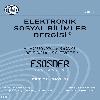İngilizce öğretmenlerinin mesleki gelişim sürecinin önünde algıladıkları başlıca engeller: Malatya ili örneği
Bu çalışmanın genel amacı, İngilizce öğretmenlerinin mesleki olarak kendilerini yenileme çabalarının önündeki engellerin neler olduğunu tanımlamak ve kategorize etmektir. Araştırma, durumu betimlemeye yönelik ve tarama modeline uygun olarak yapılmıştır. Araştırmanın çalışma evrenini, 2008–2009 öğretim yılında Malatya ilindeki ilköğretim ve ortaöğretim okullarında çalışan toplam 301 İngilizce öğretmeni oluşturmuştur. Veri toplama aracı araştırmacı tarafından geliştirilmiştir. Verilerin analizinde SPSS for Windows 15.0 paket programı kullanılmıştır. Çoklu karşılaştırmalarda Kruskal Wallis varyans analizi, ikili karşılaştırmalarda Mann Whitney U testi uygulanmıştır. Yaş ve kıdem değerleri ile boyut puanları ilişkisinde Spearman korelâsyonu analizi yapılmıştır. Anlamlılık düzeyi. 0.05 olarak alınmıştır. Analize tabi tutulan değişkenlerden yaş, kıdem, cinsiyet, öğretmenlerin mezun oldukları okul ve görev yaptıkları okul çeşitli boyutlarda mesleki gelişim açısından anlamlı farklar yaratmış olmasına rağmen, lisansüstü eğitim yapmış olma ve idari görev değişkenleri hiçbir boyutta anlamlı bulunmamıştır.
Major barbiers perceived by English teachers in their professional development process: The case of Malatya
The purpose of this study is to determine and categorize the barriers perceived by English teachers against their professional development efforts. Survey model has been used and the scope of the research involves 301 English teachers working in Malatya province. The scale conducted to the teachers has been developed by the researcher and Kruskal Wallis and Mann Whitney U statistical tests were used in SPSS for Windows 15.0 to analyze the data (P
___
- Anderson, C. A., (2008). A Quantitative Study of the Perceived Professional Development Needs Of Foreign Language Teachers Employed in Rural School Districts Within the State of South Carolina. Unpublished Docotoral Dissertation. Capella University.
- Bailey, K. M.; Curtis, A.; Nunan, D. (2001). Pursuing Professional Development. The Self as Source. Scarborough, ON:Nelson/Thompson Learning
- Caffarella, R. S.1(994). Planning Programs for Adult Learners. A Practical Guide for Educators, Trainers, and Staff Developers. San Fransisco: Jossey-Bass
- Cochran-Smith, M.(2004) Taking Stock in 2004: Teacher Education in Dangerous Times. Journal of Teacher Education, vol. 55, pp. 3–7
- Cranton, P. (1994). Self-Directed and Transformational Instructional Development Source. Journal of Higher Education, 65, 724–726
- Day, C. (1997) Teachers in the Twenty-First Century: Time to Renew the Vision, in Hargreaves, A. And Evans, R. (eds) Beyond Educational Reform. Bringing Teachers Back. Buckingham: Open University Pres, pp. 44–61
- Elam, J. H. (1996). Development Programs for Optometric Educators. Optometric Education, 21, 114–116.
- Elmore, R. F.; Fuhrman, S. H.(Eds) (1994) The Governance of Curriculum. Alexandria. VA: Associatoin for Supervision and Curriculum Development
- Eratalay, N.; Kartal, E. (2006) Yabancı Dil Öğretmenleri İçin Hizmet İçi Eğitim Uygulamaları ve Fransa Örneği Erişim Tarihi ve Sitesi: 12.03.2009; http://www.anadolu.edu.tr/arastirma/hakemli_dergiler/sosyal_bilimler/pdf/2006- /sos_bil.6.pdf
- Finlay-Parker, C. J. (2002). Professional Development Needs of College Instructors; Unpublished Doctoral Dissertation, University of Alberta; Edmonton, Alberta.
- Houle, C. O. (1996). The Design of Education (2nd Ed.). San Fransisco: Jossey Bass
- Hubbard, G. T.; Atkins, S. S. (1995). The Professor as as Person: The Role of Faculty Well-Being in Faculty Development. Innovative Higher Education, 20, 117–128 http://hedb.meb.gov.tr/tanitim.html: MEB Ertişim tarihi: 13.03.2009
- Imel, S. (1990). Managing Professional Development: A Guide for Part-time Teachers of Adults. Columbus, OH: Eric Clearinghouse on Adult, Career, and Vocational Education (ED 321155).
- Joyce, B., & Showers, B. (1980). Improving Inservice Training: The messages of Research . Educational Leadership, 37(5), 379–385.
- Kanlı U., Yağbasan, R. (2002) 2000 Yılında Ankara'da Fizik Öğretmenleri İçin Düzenlenen Hizmetiçi Eğitim Yaz Kursunun Etkinliği, Milli Eğitim Dergisi, sayı 153-154 Kış-Bahar; Erişim tarihi ve Adresi: 09.03.2009; http://yayim.meb.gov.tr/dergiler/153-154/kanli.htm
- Karasar, N. (1999). Bilimsel Araştırma Yöntemi, Nobel Yayın, Dağıtım, Ankara
- Keskil, G., (1999). English Language Teachers in Turkey:Graduates of Different Departments, Hacettepe Üniversitesi Eğitim Fakültesi Dergisi, 16–17.70–80 Erişim Tarihi ve Adresi:17.11.2008; http://www.egitimdergisi.hacettepe.edu.tr/199916.
- Levin, B. B.;Rock, T. C. (2003) The Effects of Collaborative Action Research on Preservice And Experienced Teacher Partners in Professional Development Schools. Journal of Teacher Education, vol. 54, pp. 135–149
- Livingston, C. (1992). Teacher Leadership for Restractured schools. In C. Livingston (Ed). Teachers as Leaders: Evolving Roles (pp:9–17) Washington, DC: National Education Associaton.
- Lucas, A. F. (1990). Redirecting Faculty Through Organizational Development. In Schuster, J. H., Wheeler, D. W. And Associates, Enhancing Faculty Careers (pp. 230–253). San Fransisco: Jossey-Bass.
- McKellar, N. A. (1996). Comprehensive Professional Development Plan for a College of Education. Innovative Higher Education, 20, 201–216.
- Pellicer, L. O.; Anderson, L. W. (1995). A Handbook for Teacher Leaders. Thousand Oaks. CA: Corwin Press
- Pennington, M.C. (1989) Faculty Development for Language programs. In R. K. Johnson (Ed.), The Second Language Curriculum (pp. 91–110). Cambridge: Cambridge University Press
- Schuster, J. H.; Wheeler, D. W.; Associates (1990). Enhancing Faculty Careers. San Fransisco: Jossey-Bass
- Seferoğlu, S. (2001). Sınıf Öğretmenlerinin Kendi Meslekî Gelişimleriyle İlgili Görüşleri, Beklentileri ve Önerileri, Milli, Eğitim Dergisi, 149: Alıntı Tarihi ve Yeri: 09.12.2009; http://yayim.meb.gov.tr/dergiler/149/seferoglu.htm
- Shapiro, N. S.; Levine, J. H. (1999). Creating Learning Communities: A Practical Guide to Winning Support, Organizing for Change and Implementing Programs. San Fransisco: Jossey_Bass.
- Smylie, M. A. (1988). The Enhancement Function of Staff Development: Organizational and Psychological Antecedents to Individual Teacher Change. American Educational Journal, 25, 1–30
- Wasley, P. A. (1991). Teachers Who Lead: The Rhetoric of Reform and Realities of Practice. New York: Teachers College Press.
- Zinn, L. F. (1997). Supports and Barriers to Teacher Leadership: Reports of Teacher Leaders. Unpublished doctoral Dissertaion, University of Northern Colorado, Greeley, Co.
- Yayın Aralığı: Yılda 4 Sayı
- Yayıncı: Cahit AYDEMİR
Sayıdaki Diğer Makaleler
Piyano sınavı değerlendirme puanlayıcılara yönelik geçerlik ve güvenirliği
Pedagojik formasyon eğitimi almamış öğretmenlerin sınıf yönetimi algıları/Aksaray ili örneği
Tanzimat dönemi eğitim politikalarında Osmancılık düşüncesinin etkisi
Fundamentals of islamic wconomy and finance: Theory and practice
Yaz okulu uygulamasın nedenine ilişkin öğrenci görüşleri
AY. m 36 bağlamında şikayet hakkı ile ilgili bir vakıa incelemesi-yargıtay içtihat eleştirisi
Tekstil sektöründekiişletmelerin yeşil pazarlamadan kaynaklı kazanımları
Tuncer TOKOL, Aydeniz AR AKDENİZ
Teachers' opinions on computer-assisted chemistry teaching
Sınıf öğretmenlerinin ilköğretim programlarındaki değerlendirme sürecine ilişkin görüşleri
